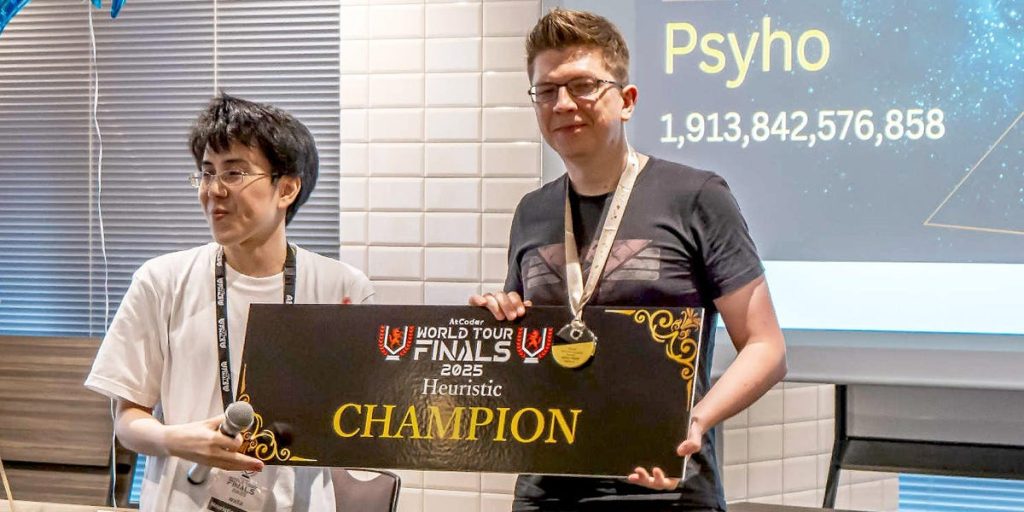AI hasn’t yet killed the coding star.
On Wednesday, a programmer from Poland, Przemysław Dębiak, beat an OpenAI tool at the AtCoder World Tour Finals 2025 Heuristic Contest in Tokyo, which is sponsored by the company.
“I was so tired. I actually felt at some point that I should take a break,” Dębiak, who competed under the name “Psyho,” told Business Insider over a video call on Friday.
“But at the same time, I was very close to getting a score comparable to the model,” he added.
That pushed him to dig deep, using “all the remaining energy” to beat the AI. “I’m trying to give 100% of what I have and try to stay alive,” he said, adding that without OpenAI’s model, his score “would be much, much lower.”
Dębiak’s victory drew the attention of OpenAI CEO Sam Altman. In a post on X on Wednesday, Altman wrote, “good job psyho.”
When reached for comment, OpenAI directed BI to a post on X, where it had written, “Our model took 2nd place at the AtCoder Heuristics World Finals! Congrats to the champion for holding us off this time.”
The contest is held annually and run by AtCoder, a Japan-based competitive programming site.
Yoichi Iwata, the competition’s administrator, told BI that OpenAI’s model outperformed those who used similar approaches, but Dębiak “arrived at a completely different solution.”
“We expected a human to win, and were rather surprised that the AI was able to secure second place,” Iwata added.
Please help BI improve our Business, Tech, and Innovation coverage by sharing a bit about your role — it will help us tailor content that matters most to people like you.
What is your job title?
(1 of 2)
What products or services can you approve for purchase in your role?
(2 of 2)
Continue
this data to improve your site experience and for targeted advertising.
By continuing you agree that you accept the
Terms of Service
and
Privacy Policy
.
Thanks for sharing insights about your role.
“While the AI surpassed humans in terms of optimization ability, we believe it still fell short of human creativity.”
The competition’s results page shows Dębiak prevailing over competitors from Japan, Georgia, and France. On Friday, Dębiak shared a results page on X that showed him as the competition’s victor and OpenAI in second place.
“The results are official now and my lead over AI increased from 5.5% to 9.5%,” he wrote.
After winning the competition on Wednesday, Dębiak celebrated his win online, writing, “Humanity has prevailed (for now!)”, adding that he was “completely exhausted” after just 10 hours of sleep in three days. He told BI he flew from Warsaw to Tokyo for the competition.
The programmer wrote on X that he did not use AI tools, just “regular” Visual Studio Code, a software development platform, with “some basic autocomplete to speed up repetitive stuff.”
Dębiak, 41, told BI he only found out about OpenAI’s entry a week before the contest.
“No one knew that this would be, to some extent, an exhibition match between humans and AI,” he said.
The stars aligned for the human
AI will win in cases that require straightforward engineering — implementing algorithms, solving the problem, and optimizing code — because it’s simply faster, Dębiak told BI.
But in longer contests where programmers “do everything from scratch,” he said, AI has a harder time keeping up.
“The longer the contest is, the more chances for humans and less chances for AI,” he said, adding that he overtook OpenAI’s tool near the end of the 10-hour competition.
Dębiak said he competed in “algorithmic optimization,” where the goal was to write the most efficient solution to a complex problem. In this competition, he had to code a program that guided robots across a 30×30 grid using the fewest moves possible.
Reflecting on the competition, Dębiak said the variables lined up in his favor.
“It’s easy to imagine a different problem where AI would win and all the humans would be like far, far away,” he added.
AI has famously beaten humans in other high-profile competitions. In 1997, IBM’s Deep Blue AI machine beat chess grandmaster Gary Kasparov, and in 2016, Google DeepMind’s AlphaGo beat Go world champion Lee Sedol.
In February, Altman said that by the end of the year, OpenAI could surpass humans in coding competitions.
AI is already writing big chunks of code at Microsoft, Google, and Meta, the companies’ CEOs have all said in recent months.
Altman has said that demand for software engineers could eventually dip.
“My basic assumption is that each software engineer will just do much, much more for a while. And then at some point, yeah, maybe we do need less software engineers,” he said in March, referring to OpenAI’s hiring strategy.

